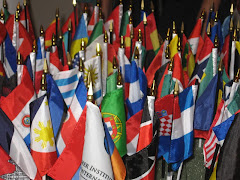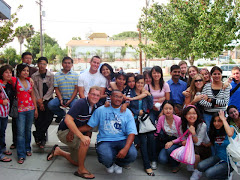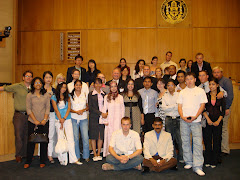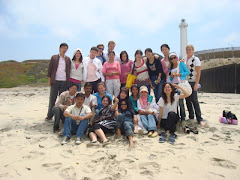 Best regards to all of the Hansenian fellows. I wish I met all of you guys on the inaugural HSI program but…! Anyways, hope to meet you some day in the future.
Best regards to all of the Hansenian fellows. I wish I met all of you guys on the inaugural HSI program but…! Anyways, hope to meet you some day in the future.Thanks a lot for this opportunity the Hansenian team offers me to say a word on the conflict situation in Africa as well as in my region, (The African Great Lake Region).
Recent years have seen many regions of Africa involved in war and internal or external conflict, from the seven or so countries directly involved in the Democratic Republic of Congo (DRC) to the Sierra Leone crisis and the war in Ethiopia/Eritrea and the various other civil wars.
There have been over 9.5 million refugees and hundreds and thousands of people have been slaughtered in Africa from these conflicts. If this scale of destruction and fighting were in Europe, then people would be calling it World War III with the entire world rushing to report, provide aid, mediate and otherwise try to diffuse the situation.
According to me, the major root cause of conflicts in the whole African continent is the legacy of European colonialism that had a devastating impact on Africa. The artificial boundaries created by colonial rulers as they ruled and finally left Africa had the effect of bringing together many different ethnic people within a nation that did not reflect, nor have (in such a short period of time) the ability to accommodate or provide for, the cultural and ethnic diversity. The natural struggle to rebuild is proving difficult.
Some have commented that pointing to colonialism is not an excuse as many African countries have had decades to try and resolve this. The implication of the argument is that the effects of centuries of colonialism, in effect, are supposed to be overcome in just a few short years. Yet, as Richard Robbins, professor of anthropology suggests, if countries like Canada have been struggling with accommodating different groups, then in Africa the problem is more complex:
We must remember that the European agreements that had carved up Africa into states paid little attention to cultural and ethnic boundaries and ethnic groups had little opportunity or need to form political alliances or accommodations under repressive colonial rule.… Think of countries such as Canada again, which has been trying for hundreds of years with mixed success to accommodate only two linguistic groups — English and French — and you get an idea of the problems of African states with far greater cultural and linguistic divisions.
(My country, the DRC has four official languages and over 430 dialects; I know for sure this is a source of many conflicts inside the country.)
The African Great Lakes Region has experienced prolonged instability, thus lack of peace and justice for quite some time. This is now engulfed in a war that has drawn in other countries for a number of complex reasons, including conflicts over basic resources such as water, access and control over rich minerals and other resources as well as various political agendas. This has been fueled and supported by various national and international corporations and other regimes which have an interest in the outcome of the conflict.
Since April 1994, the DRC has been rent by ethnic civil war, touched off by a massive inflow of Rwandan refugees fleeing the genocide. These refugees were a mix of civilians, Interahamwe (the militia largely held responsible for the genocide and members of the defeated Rwandan army [FAR]). The refugee camps quickly became controlled by the Interahamwe and FAR. Over the next few years, these groups (with the blessing of Mobutu’s central government and regional strongmen) reorganized and rearmed. Soon they began launching attacks from the camps into neighboring Rwanda and Uganda.
This is why the Rwandan and Ugandan regimes began looking for a Congolese face to put on their intervention into Mobutu’s Zaire in order to aim at delivering what they hoped would be a deathblow to their respective rebels buy cutting off their supply lines, driving them out of their Zairian rear bases and ousting their longtime benefactor, Mobutu.
When Laurent Kabila came to power in May 1997, toppling Marshall Mobutu, with the aid of Rwanda, Uganda, Angola, Burundi and Eritrea, it was hoped that there was going to be peace and stability in the region.
In stead, these hopes were quickly dashed when the situation deteriorated. Kabila had been accused by rebels (made up of Congolese soldiers, Congolese Tutsi Banyamulenge, Rwandan, Ugandan and some Burundian government troops) of turning into a dictator, of mismanagement, corruption and supporting various paramilitary groups who oppose his former allies.
Since the second outbreak of fighting in August 1998, at least 3.3 million people, mostly women, children and the elderly, are estimated to have died because of the conflict, most from disease and starvation. More than 2.25 million people have been driven from their homes; many of them beyond the reach of humanitarian agencies
The main fighting has been on the eastern side of DRC and over three quarters of the estimated number of killings have taken place there, with approximately 90 per cent of the DRC’s internally displaced population having fled violence from that region.
This was the beginning of a terrible hatred between eastern Congo’s population and all the countries involved in the rebellion. Almost each family was victim of this conflict by having lost at least a member.
That’s why in North and South Kivu Provinces, the many people terribly hate Congolese Tutsi Banyamulenge and all Rwandan people (especially Interahamwe militia who are still carrying out most of massacres in South Kivu Province). They are accused of being responsible for the havoc in the mentioned provinces. In Province Orientale (Bunia, Ituri, etc.) many people are hostile to Ugandans, also held responsible for many crimes committed there.
The hard task we have in order to cope with this dangerous situation is to keep the new generations out of it.
For this aim, I recently created a youth Association named « League de la Jeunesse pour la Paix et le Développement dans la Région des Grands Lacs ». It’s dealing with peace and reconciliation in different Countries of the region.
This association has already some members in Kigali/Rwanda and Bujumbura/Burundi. My vision is to spread it over the whole region (DRC, Rwanda, Burundi, Uganda and Tanzania) in order to have all the youth of the respective countries participate actively in the reconciliation, peace and development of the Region for a more peaceful future.
Is there any Hansenian who can suggest another way to keep future generations out of this situation for the more peaceful African Great Lakes Region?
Thanks you, guys!







1 comment:
Hello,
I really enjoy your blog.
I'm conducting feminist research on how American foreign policy affects popular support for terrorism. I’m particularly interested in incorporating the views of women, non-whites, and people living outside of America and Western Europe, but all responses are invited and welcome. The survey can be accessed at
http://www.johnmaszka.com/SURVEY.html
I would really value your opinion and the opinion of your readers.
Thank you,
John Maszka
Post a Comment